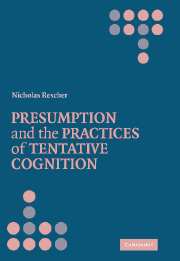Book contents
- Frontmatter
- Contents
- Preface
- Presumption and the Practices of Tentative Cognition
- 1 The Legal Roots Of Presumption
- 2 Presumption and Burden of Proof
- 3 Cognitive Presumption and Truth
- 4 Validating Cognitive Presumptions
- 5 Presumption and Inquiry
- 6 Default Reasoning
- 7 Presumption and Trust
- 8 Presumption and Communication
- 9 Presumption in Science and Beyond
- 10 Specificity Prioritization and the Primacy of the Particular
- 11 Dismissing Extremely Remote Possibilities
- Conclusion
- Bibliography
- Index of Names
9 - Presumption in Science and Beyond
Published online by Cambridge University Press: 24 July 2009
- Frontmatter
- Contents
- Preface
- Presumption and the Practices of Tentative Cognition
- 1 The Legal Roots Of Presumption
- 2 Presumption and Burden of Proof
- 3 Cognitive Presumption and Truth
- 4 Validating Cognitive Presumptions
- 5 Presumption and Inquiry
- 6 Default Reasoning
- 7 Presumption and Trust
- 8 Presumption and Communication
- 9 Presumption in Science and Beyond
- 10 Specificity Prioritization and the Primacy of the Particular
- 11 Dismissing Extremely Remote Possibilities
- Conclusion
- Bibliography
- Index of Names
Summary
Presumptions in Science
Philosophers of science often puzzle about the prominent but yet problematic role of such theoretical factors of inductive reasoning as regularity, continuity, simplicity, uniformity, conservation, and the like. It would clearly be problematic to regard such factors as representing fundamentally ontological facts about the world – an inclination on the part of nature itself (to put it somewhat anthropomorphically). It would, however, make perfectly good sense to view such factors as representing principles of procedural presumption – forming part of the regulative or methodological mechanism of our vehicles of explanation. One thereby avoids treating such features of systematicity as substantive findings about nature but rather as methodological, and procedural guideposts for our conduct of scientific inquiry – procedural principles of plausibility that constitute our evaluative standards for explanatory accounts.
In this way, a positive presumption of acceptability is taken to operate in favor of all the traditional parameters of systematization: consistency, uniformity, regularity (causality, rulishness, and lawfulness in all forms), simplicity, connectedness/coherence, unity/completeness, and the rest. These various defining facets of systematicity thus come to do double duty as elements of a criteriology for acceptability-as-true and as presumptive principles regulatively governing the conduct of inquiry. The resulting situation is set out in Display 9.1.
- Type
- Chapter
- Information
- Presumption and the Practices of Tentative Cognition , pp. 124 - 137Publisher: Cambridge University PressPrint publication year: 2006



